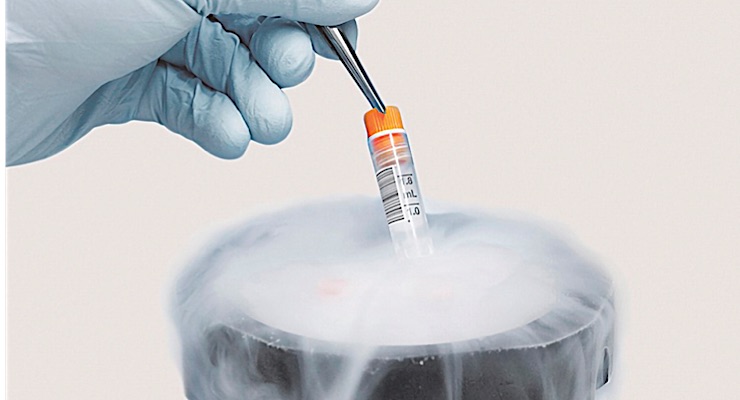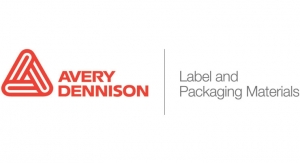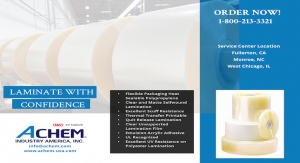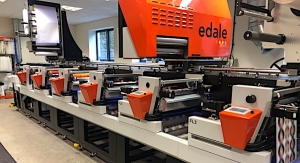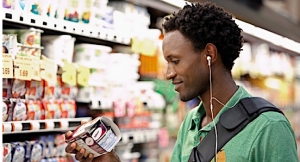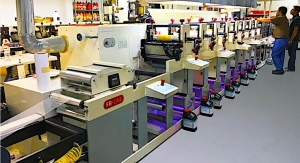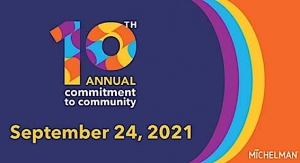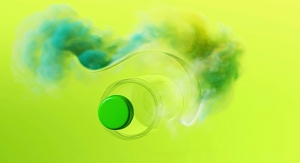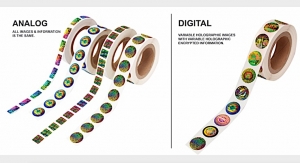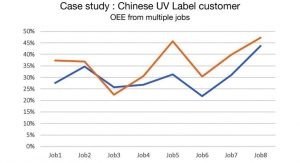Greg Hrinya, Editor02.26.21
The right coating or adhesive can make all the difference in a label’s effectiveness. In the case of pharmaceutical labeling, the outcome is critical in assuring the safety of the product – and the patient.
Adhesives are key in a wide range of applications, ranging from over-the-counter (OTC) drugs and nutraceuticals to vitamins and ethical pharma. Security and durability are of the utmost importance, meaning the labelstock and adhesives are required to perform specific functions.
Avery Dennison, a substrate and adhesive supplier based in Mentor, OH, USA, has engineered a host of adhesives to meet the varying demands of the marketplace. For example, pharma security solutions must overtly show that a product has been tampered with or altered in some way. A fiber tear necessitates a label with a strong adhesive that will damage the underlying varnish box packaging if removed, while void labels show hidden text or pattern when the label is removed. Sharp tear and frangible labels require adhesives that allow the label to tear or break apart in small pieces upon tampering.
“The Avery Dennison Pharmaceutical and Healthcare Portfolio features a dedicated range of paper and film facestocks, as well as four adhesives that have been independently tested for an added layer of protection, including testing for skin and eye irritation, as well as acute oral toxicity,” explains Cory Keller, senior product manager, pharmaceutical, Avery Dennison Label and Packaging Materials. “Another key aspect of the portfolio is robust change management and advanced notification, which can take anywhere from 3-12 months depending on the type of component change.”
According to Keller, pharma labeling adhesives must perform in some of the most challenging environments. The company’s adhesives are required to withstand sterilization processes, including autoclave (pressurized steam at +121C /+249 F), ethylene Oxide Gas - ETO (temperatures of +25C/+77F and up to +55 C/+131 F) and radiation such as gamma ray or electron beam (ambient room temps).
“Aggressive adhesion prevents ‘label lift’ on small diameter containers (down to 0.25”), which is common for pre-filled syringes,” states Keller. “Adhesion in ultra-low temperature and cryogenic environments is also key, as biologic drugs and vaccines often require transportation and storage in deep freeze environments like dry ice -78 C (-109 F), as well as storage in liquid nitrogen -196C (-320F).”
Avery Dennison relies on four main adhesives to serve this market. For a general-purpose, permanent hot-melt adhesive, S246 features high initial tack and ultimate adhesion. S246 is suitable for consumer healthcare applications requiring a minimum component change notification commitment (three months). S692NP is a general-purpose, permanent emulsion acrylic adhesive with good adhesion to low-energy substrates like squeezable containers. “These adhesives are often used in applications requiring sterilization,” says Keller. “They are Ideal for consumer healthcare applications requiring moderate change notification commitment (6 months). They meet the minimum application temperature of +23 F and service temperature ranges of -20F to +200F.”
Plus, S717P is a high performance, permanent emulsion acrylic adhesive ideal for tight mandrel labeling. It has seen adoption for critical pharmaceutical applications requiring an extended component change notification commitment (12 months). Finally, S727 is a high performance, permanent solvent acrylic adhesive designed for tight mandrel labeling. Widely used in applications requiring sterilization, this product is ideal for critical pharmaceutical applications requiring an extended component change notification commitment (12 months).
Avery Dennison has also developed a Cold Chain and Cryogenic Portfolio to meet the most stringent needs of the pharmaceutical market. This portfolio can help ensure clear identification of biological materials from collection to storage, transportation and delivery - even in harsh deep freeze environments like dry ice (-78C / -109F), as well as storage in liquid nitrogen (-196C or -109F).
“Materials in the portfolio can be applied to plastic and glass containers, tubes, and vials and well as aluminum canisters and other challenging surfaces,” details Keller. “The primary adhesives in the portfolio are C0196 and C0320. C0196 is a permanent solvent acrylic adhesive specifically designed for labels used in low temperatures when using liquid nitrogen during deep freeze processes. The adhesive will withstand sterilization conditions such as steam autoclave and gamma radiation. Meanwhile, C0320 is a permanent emulsion acrylic adhesive and like C0196 is designed for ultra-low temperature applications and can withstand autoclave and gamma radiation sterilization. However, unlike C0196, C0320 has a much lower minimum application temperature of -196C (-320F) and a higher top end service temperature of +100C (+212F).”
In the future, smart labeling and sustainability are also poised to impact the pharmaceutical industry. At Avery Dennison, its portfolio of RFID inlays can be paired with pharmaceutical label materials or transfer adhesives to create intelligent labels for multiple use cases such as track-and-trace, inventory management, or consumer engagement. From the environmental side, Keller adds that Avery Dennison is seeing increased interest by large pharmaceutical companies to move to more sustainable packaging solutions.
Adhesives are key in a wide range of applications, ranging from over-the-counter (OTC) drugs and nutraceuticals to vitamins and ethical pharma. Security and durability are of the utmost importance, meaning the labelstock and adhesives are required to perform specific functions.
Avery Dennison, a substrate and adhesive supplier based in Mentor, OH, USA, has engineered a host of adhesives to meet the varying demands of the marketplace. For example, pharma security solutions must overtly show that a product has been tampered with or altered in some way. A fiber tear necessitates a label with a strong adhesive that will damage the underlying varnish box packaging if removed, while void labels show hidden text or pattern when the label is removed. Sharp tear and frangible labels require adhesives that allow the label to tear or break apart in small pieces upon tampering.
“The Avery Dennison Pharmaceutical and Healthcare Portfolio features a dedicated range of paper and film facestocks, as well as four adhesives that have been independently tested for an added layer of protection, including testing for skin and eye irritation, as well as acute oral toxicity,” explains Cory Keller, senior product manager, pharmaceutical, Avery Dennison Label and Packaging Materials. “Another key aspect of the portfolio is robust change management and advanced notification, which can take anywhere from 3-12 months depending on the type of component change.”
According to Keller, pharma labeling adhesives must perform in some of the most challenging environments. The company’s adhesives are required to withstand sterilization processes, including autoclave (pressurized steam at +121C /+249 F), ethylene Oxide Gas - ETO (temperatures of +25C/+77F and up to +55 C/+131 F) and radiation such as gamma ray or electron beam (ambient room temps).
“Aggressive adhesion prevents ‘label lift’ on small diameter containers (down to 0.25”), which is common for pre-filled syringes,” states Keller. “Adhesion in ultra-low temperature and cryogenic environments is also key, as biologic drugs and vaccines often require transportation and storage in deep freeze environments like dry ice -78 C (-109 F), as well as storage in liquid nitrogen -196C (-320F).”
Avery Dennison relies on four main adhesives to serve this market. For a general-purpose, permanent hot-melt adhesive, S246 features high initial tack and ultimate adhesion. S246 is suitable for consumer healthcare applications requiring a minimum component change notification commitment (three months). S692NP is a general-purpose, permanent emulsion acrylic adhesive with good adhesion to low-energy substrates like squeezable containers. “These adhesives are often used in applications requiring sterilization,” says Keller. “They are Ideal for consumer healthcare applications requiring moderate change notification commitment (6 months). They meet the minimum application temperature of +23 F and service temperature ranges of -20F to +200F.”
Plus, S717P is a high performance, permanent emulsion acrylic adhesive ideal for tight mandrel labeling. It has seen adoption for critical pharmaceutical applications requiring an extended component change notification commitment (12 months). Finally, S727 is a high performance, permanent solvent acrylic adhesive designed for tight mandrel labeling. Widely used in applications requiring sterilization, this product is ideal for critical pharmaceutical applications requiring an extended component change notification commitment (12 months).
Avery Dennison has also developed a Cold Chain and Cryogenic Portfolio to meet the most stringent needs of the pharmaceutical market. This portfolio can help ensure clear identification of biological materials from collection to storage, transportation and delivery - even in harsh deep freeze environments like dry ice (-78C / -109F), as well as storage in liquid nitrogen (-196C or -109F).
“Materials in the portfolio can be applied to plastic and glass containers, tubes, and vials and well as aluminum canisters and other challenging surfaces,” details Keller. “The primary adhesives in the portfolio are C0196 and C0320. C0196 is a permanent solvent acrylic adhesive specifically designed for labels used in low temperatures when using liquid nitrogen during deep freeze processes. The adhesive will withstand sterilization conditions such as steam autoclave and gamma radiation. Meanwhile, C0320 is a permanent emulsion acrylic adhesive and like C0196 is designed for ultra-low temperature applications and can withstand autoclave and gamma radiation sterilization. However, unlike C0196, C0320 has a much lower minimum application temperature of -196C (-320F) and a higher top end service temperature of +100C (+212F).”
In the future, smart labeling and sustainability are also poised to impact the pharmaceutical industry. At Avery Dennison, its portfolio of RFID inlays can be paired with pharmaceutical label materials or transfer adhesives to create intelligent labels for multiple use cases such as track-and-trace, inventory management, or consumer engagement. From the environmental side, Keller adds that Avery Dennison is seeing increased interest by large pharmaceutical companies to move to more sustainable packaging solutions.

